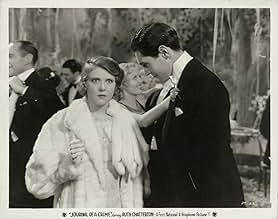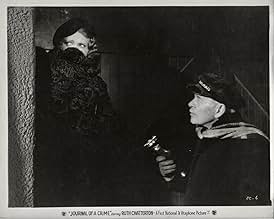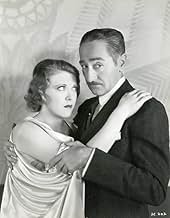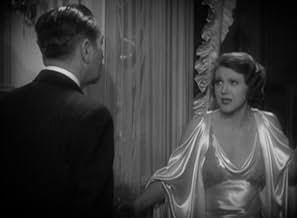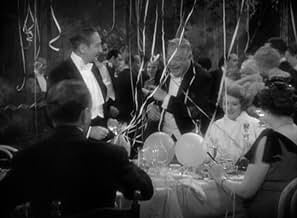Adicionar um enredo no seu idiomaA wife shoots her husband's mistress. Afterwards, she is tormented by guilt when someone else is blamed for the crime.A wife shoots her husband's mistress. Afterwards, she is tormented by guilt when someone else is blamed for the crime.A wife shoots her husband's mistress. Afterwards, she is tormented by guilt when someone else is blamed for the crime.
- Direção
- Roteiristas
- Artistas
- Germaine Cartier
- (as Douglas Dumbrille)
- Frau Winterstein
- (as Elsa Jansen)
- Paul's Valet
- (não creditado)
- Chorus Girl
- (não creditado)
- Man at Play Party
- (não creditado)
- Direção
- Roteiristas
- Elenco e equipe completos
- Produção, bilheteria e muito mais no IMDbPro
Avaliações em destaque
- BANG! -
Then the crime takes place, and by amazing coincidence a bank robber just happens to be hanging around backstage to take the fall for the real culprit. The coincidences now start piling on faster and faster, crammed into an incredible 64 minutes whose tortuous twists and turns are probably the result of the writing being on the wall about the new Production Code just months away. The code wasn't in force yet, so both adultery and murder go unpunished; but the narrative that follows twists itself into greater and greater contortions in seeming anticipation of Joseph Breen's coming blue pencil.
The story opens in Paris (where nobody speaks with a French accent) during the late evening hours where Francoise (Ruth Chatterton) is seen outside the theater where her playwright husband Paul (Adolphe Menjou) and its director, Chautard (George Barbier) are inside rehearsing a musical play titled "Adecia." Once outside, she spots and overhears Paul conversing with Odette Floret (Claire Dodd), its leading lady who happens to be her husband's mistress, discussing for Paul to divorce his wife and marry her or else their affair is over. Unable to hurt his wife, Paul, who is desperately in love with Odette, makes his promise to her. Arriving home at 3 a.m., Paul finds Francoise awaiting him, but is unable to break the news to her. The next day, during rehearsals, Paul informs Odette he couldn't tell his wife, but promises to do so that very night. At the same time, Costelli (Noel Madison) 13 blocks away from the theater, robs the bank, killing its bank clerk. With the police in hot pursuit, Costelli abandons his car and hides inside the theater mixing with the crowd in rehearsal. Inside the auditorium, a gunshot is heard, killing Odette on stage, causing a search and capture of Costelli put under arrest. Paul discovers his own gun inside a bucket of water and immediately believes his wife responsible. Refusing to admit her crime of passion to the police, with Francoise wanting to hold on to her husband, Paul remains with his wife, awaiting for the day she confesses to the police, secrets written privately through her day by day accounts in her journal of a crime. Co-starring Douglass Dumbrille, Philip Reed, Henry O'Neill, Henry Kolker, Jane Darwell and twelfth billed, Walter Pidgeon.
What attracted me to JOURNAL OF A CRIME initially was the 12th billed Walter Pidgeon, a former leading actor in late silent and early talkies (1928-1931) who would achieve major stardom in the 1940s. Aside from he briefly seen singing during the rehearsal sequences involving Claire Dodd, he is given no camera close-ups nor major scenes. Another thing that attracted me to this production is Ruth Chatterton. With a handful of movie roles for Paramount and Metro-Goldwyn-Mayer dating back to 1928, the only movie of hers to be repeatedly televised since the 1960s was her iconic role in DODSWORTH (Samuel Goldwyn, 1936) starring Walter Huston. Thanks for cable channel as Turner Classic Movies are the Chatterton/Warner Brothers dramas (1932-1934) revived and rediscovered again. Beautiful Claire Dodd, typically cast as the other woman, is no different here than her other movies of this era. She's a fine actress rarely given a chance to act against type. Adolphe Menjou is satisfactory, as always, playing the grief-stricken husband.
The premise of JOURNAL OF A CRIME is a reminder of W. Somerset Maugham's play and motion picture retelling of "The Letter" in which wife murders her lover, in this instance, her husband's lover, and how the wife must suffer for her sins of her crime. And how Chatterton suffers. Also available on DVD to see how the movie finishes. (**1.2)
In this film, she's married to Adolph Menjou. Menjou is in love with the ingénue lead in his play. She's playing for keeps and warns her lover if he doesn't get a divorce, they're through. Chatterton overhears this and kills her during a rehearsal. Her husband knows about it, but another man, a bank robber, is arrested. She refuses to go to the police.
It's actually a psychological drama, with Menjou predicting she will destroy herself because of guilt. She does start to sink downhill.
Some say this was a weak ending, and I suppose it was, but it is an interesting one, if contrived. I kind of liked it.
I think it's worth seeing some of these very early stars, and I especially enjoy Ruth Chatterton's performances.
** 1/2 (out of 4)
Decent melodrama from Warner has Ruth Chatterton playing a wife who finds out that her husband (Adolphe Menjou) is in love with another woman (Claire Dodd). Fearing that she's going to lose him forever, the wife shoots the lover and gets away with it but when the husband finds out he decides not to tell anyone because he feels the best justice is for his wife to slowly crack under the guilt. This pre-Code isn't the greatest film ever made and there are quite a few problems with the story but the performance of Chatterton makes it worth sitting through if you enjoy this period of Hollywood. I think the best thing going for the film is the performance of Chatterton who is quite believable as the grieving wife. The screenplay goes all over the place with her character so Chatterton has to go through a wide range of emotions. She nails everyone of them and especially the scenes early on when she learns that her husband no longer loves her and she does what she can to try and save her marriage. This good sequence is followed by her slowly turning to rage when she realizes that it really doesn't matter what she does as the husband has his heart made up. Chatterton has always been an underrated actress and her performance here proves she could handle just about anything. Menjou is always good and that continues here as he could play this type of role in his sleep. I especially loved the way he remains calm, cool and collective while trying to force the guilt trip on the wife. Dodd doesn't appear in the film for too long but she's good while there. The screenplay is the main villain here because it's never quite clear where the picture wants to go and while I won't ruin the ending I will say it's incredibly stupid as it really doesn't close anything up. Yes, it closes the "past" up but everything with the husband and his feelings are pretty much untouched. At just 64-minutes the film moves well enough and is okay for a one-time viewing.
Você sabia?
- CuriosidadesThe opera shown on the theatrical posters in the opening scenes is "Adelia," by Donizetti.
- Erros de gravaçãoSomeone as "highly intelligent" as Francoise would not have disposed of the murder weapon in a bucket of water, where someone would be sure to find it.
- Citações
Dinner Guest: The way I look at it, Mr. Attorney General, there will be crimes of passion as long as there is passion.
Germaine Cartier: In my opinion, madame, the urge to kill has roots in hatred, rather than in passion or in love. Hatred in it's most severe form. Jealousy. Don't you agree with me?
Francoise Moliet: Well, you may be right, Mr. Attorney General. I don't know, but, a woman - or a man - may have a deeper motive for killing than jealousy or even love. A human being could kill because she herself has first been killed. Before she kills, the other two, the victim and her accomplice, must have killed her soul. Murdered it. A soul that murders in it's turn.
- Cenas durante ou pós-créditosOpening credits are shown on the pages of a book, a reference to the "journal" in the title.
- ConexõesRemake of Une vie perdue (1933)
Principais escolhas
Detalhes
- Data de lançamento
- País de origem
- Idiomas
- Também conhecido como
- Journal of a Crime
- Locações de filme
- Empresa de produção
- Consulte mais créditos da empresa na IMDbPro
- Tempo de duração
- 1 h 5 min(65 min)
- Cor
- Mixagem de som
- Proporção
- 1.37 : 1

